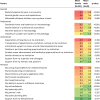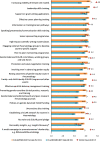Gender equity in academic rheumatology, current status and potential for improvement: a cross-sectional study to inform an EULAR task force
- PMID: 35940824
- PMCID: PMC9367178
- DOI: 10.1136/rmdopen-2022-002518
Gender equity in academic rheumatology, current status and potential for improvement: a cross-sectional study to inform an EULAR task force
Abstract
Objectives: Evidence on the current status of gender equity in academic rheumatology in Europe and potential for its improvement is limited. The EULAR convened a task force to obtain empirical evidence on the potential unmet need for support of female rheumatologists, health professionals and non-clinical scientists in academic rheumatology.
Methods: This cross-sectional study comprised three web-based surveys conducted in 2020 among: (1) EULAR scientific member society leaders, (2) EULAR and Emerging EULAR Network (EMEUNET) members and (3) EULAR Council members. Statistics were descriptive with significance testing for male/female responses assessed by χ2 test and t-test.
Results: Data from EULAR scientific member societies in 13 countries indicated that there were disproportionately fewer women in academic rheumatology than in clinical rheumatology, and they tended to be under-represented in senior academic roles. From 324 responses of EULAR and EMEUNET members (24 countries), we detected no gender differences in leadership aspirations, self-efficacy in career advancement and work-life integration as well as the share of time spent on research, but there were gender differences in working hours and the levels of perceived gender discrimination and sexual harassment. There were gender differences in the ranking of 7 of 26 factors impacting career advancement and of 8 of 24 potential interventions to aid career advancement.
Conclusions: There are gender differences in career advancement in academic rheumatology. The study informs a EULAR task force developing a framework of potential interventions to accelerate gender-equitable career advancement in academic rheumatology.
Keywords: epidemiology; health services research; qualitative research.
© Author(s) (or their employer(s)) 2022. Re-use permitted under CC BY-NC. No commercial re-use. See rights and permissions. Published by BMJ.
Conflict of interest statement
Competing interests: None declared.
Figures





Similar articles
-
Coalition for Health and Gender Equity (CHANGE)-a protocol for a global cross-sectional survey of health and gender equity in rheumatology.Rheumatol Adv Pract. 2024 Feb 10;8(2):rkae021. doi: 10.1093/rap/rkae021. eCollection 2024. Rheumatol Adv Pract. 2024. PMID: 38560641 Free PMC article.
-
Gender equity in academic rheumatology: is there a gender gap at European rheumatology conferences?RMD Open. 2022 Mar;8(1):e002131. doi: 10.1136/rmdopen-2021-002131. RMD Open. 2022. PMID: 35246471 Free PMC article. Review.
-
Mentoring of young professionals in the field of rheumatology in Europe: results from an EMerging EUlar NETwork (EMEUNET) survey.Clin Exp Rheumatol. 2014 Nov-Dec;32(6):935-41. Epub 2014 Sep 8. Clin Exp Rheumatol. 2014. PMID: 25198292
-
Mentoring for postdoctoral researchers in rheumatology: the Emerging EULAR Network (EMEUNET) post-doc mentoring programme.RMD Open. 2020 Feb;6(1):e001139. doi: 10.1136/rmdopen-2019-001139. Epub 2020 Feb 3. RMD Open. 2020. PMID: 32584783 Free PMC article.
-
EULAR portfolio for Rheumatology training: a EULAR School of Rheumatology initiative.RMD Open. 2021 Jun;7(2):e001684. doi: 10.1136/rmdopen-2021-001684. RMD Open. 2021. PMID: 34135115 Free PMC article.
Cited by
-
Gender equity in rheumatology leadership in the Asia-Pacific.Rheumatol Adv Pract. 2022 Oct 25;6(3):rkac087. doi: 10.1093/rap/rkac087. eCollection 2022. Rheumatol Adv Pract. 2022. PMID: 36382268 Free PMC article.
-
Trends and influences in women authorship in randomised controlled trials in rheumatology: a comprehensive analysis of all published RCTs from 2009 to 2023.RMD Open. 2025 Mar 27;11(1):e005341. doi: 10.1136/rmdopen-2024-005341. RMD Open. 2025. PMID: 40154562 Free PMC article.
-
Coalition for Health and Gender Equity (CHANGE)-a protocol for a global cross-sectional survey of health and gender equity in rheumatology.Rheumatol Adv Pract. 2024 Feb 10;8(2):rkae021. doi: 10.1093/rap/rkae021. eCollection 2024. Rheumatol Adv Pract. 2024. PMID: 38560641 Free PMC article.
-
Global excellence in rheumatology: Africa-The contribution of African women rheumatologists.Front Med (Lausanne). 2022 Nov 25;9:1032122. doi: 10.3389/fmed.2022.1032122. eCollection 2022. Front Med (Lausanne). 2022. PMID: 36507499 Free PMC article.
-
Gender bias in Argentine rheumatology research: a bibliometric analysis.Rheumatol Int. 2025 Apr 26;45(5):126. doi: 10.1007/s00296-025-05885-5. Rheumatol Int. 2025. PMID: 40285893
References
-
- World Health Organization . Gender, equity and human rights. Available: https://www.who.int/gender-equity-rights/knowledge/glossary/en/
Publication types
MeSH terms
Grants and funding
LinkOut - more resources
Full Text Sources
